
INTERNATIONAL JOURNAL OF OFFENDER THERAPY AND COMPARATIVE CRIMINOLOGY
Scope & Guideline
Connecting theory and practice in offender rehabilitation.
Introduction
Aims and Scopes
- Interdisciplinary Research:
The journal promotes studies that integrate insights from criminology, psychology, sociology, and law, fostering a holistic understanding of criminal behavior and rehabilitation. - Comparative Analyses:
It emphasizes comparative studies across different cultural and legal systems, enhancing the understanding of how various factors influence crime and rehabilitation. - Focus on Rehabilitation and Treatment:
The journal emphasizes research on effective rehabilitation methods and treatment programs for offenders, particularly in the context of mental health and substance abuse. - Impact of Social Factors:
Research that explores the role of social and familial influences on criminal behavior and rehabilitation is a core area of interest, highlighting the importance of context in understanding offenders. - Victimology and Offender Interaction:
The journal also addresses the relationship between victims and offenders, exploring the implications for treatment, justice, and policy. - Emerging Technologies in Criminology:
Studies that investigate the role of technology in crime prevention, rehabilitation, and assessment are increasingly featured, reflecting the evolving nature of criminological research.
Trending and Emerging
- Mental Health and Substance Abuse:
There is a notable increase in research addressing the intersection of mental health issues and substance abuse among offenders, highlighting the need for integrated treatment approaches. - Restorative Justice Practices:
Emerging themes include the efficacy of restorative justice practices, with studies exploring how these approaches can aid in offender rehabilitation and victim support. - Impact of Childhood Adversity:
Research exploring the effects of childhood adversity on later criminal behavior is gaining traction, emphasizing the importance of early intervention and prevention strategies. - Gender-Specific Offender Studies:
There is a growing focus on understanding the unique experiences and needs of female offenders, as well as the influence of gender dynamics in criminal behavior and rehabilitation. - Technological Integration in Rehabilitation:
Increasingly, the journal features studies on the use of technology in rehabilitation programs, including virtual therapy and digital interventions, reflecting modern trends in treatment delivery. - Community Reintegration and Support Systems:
Research that examines the role of community support in the reintegration process for formerly incarcerated individuals is trending, emphasizing the importance of social networks in reducing recidivism.
Declining or Waning
- Traditional Punishment Models:
There is a noticeable decrease in research focusing solely on punitive measures without considering rehabilitation, as the field increasingly recognizes the importance of restorative justice and rehabilitation. - General Crime Statistics:
Publications that primarily report on crime statistics without contextual analysis or deeper exploration of underlying causes are becoming less frequent, as there is a greater emphasis on understanding the complexities of criminal behavior. - Static Risk Assessment Tools:
Studies focusing exclusively on static risk assessment tools are waning, with a shift towards dynamic assessments that consider changing risk factors and rehabilitation progress. - Single-Dimensional Studies:
Research that examines offender behavior from a one-dimensional perspective, such as solely psychological or sociological, is being overshadowed by more integrated approaches that consider multiple influencing factors. - Focus on Adult Offenders Over Juveniles:
There seems to be a reduced emphasis on studies focusing exclusively on adult offenders, with a growing interest in juvenile delinquency and the unique challenges faced by young offenders.
Similar Journals

JOURNAL OF CRIMINAL LAW & CRIMINOLOGY
Shaping the Future of Criminal Justice DiscourseJournal of Criminal Law & Criminology, published by Northwestern University, is a premier scholarly journal dedicated to advancing the understanding of criminal law and criminological theories. Established in 1974, it has a strong history of publishing rigorous empirical research and critical analyses, contributing significantly to the discourse in legal and criminal justice studies. With an impressive impact factor and recognized as a Q1 journal in Law, it ranks favorably within the Scopus database, positioned in the top 25% of its category. This journal is essential for academics, legal practitioners, and students seeking insightful perspectives and developments in contemporary criminal justice issues. Although not open access, it provides a wealth of resources and discussions, making it an invaluable asset for anyone engaged in the study of law and criminology.
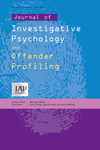
Journal of Investigative Psychology and Offender Profiling
Deepening Insights into the Psychology of Offenders.Journal of Investigative Psychology and Offender Profiling, published by WILEY in the United Kingdom, is a leading resource dedicated to the exploration of psychological theories and methodologies as they relate to criminal behavior and offender profiling. With an ISSN of 1544-4759 and an E-ISSN of 1544-4767, this journal serves as a critical platform for researchers, professionals, and students engaged in the fields of Applied Psychology and Social Psychology. The journal's impact is underscored by its recent ranking in the Q3 quartile for Applied Psychology and Q4 for Social Psychology, as well as its significant positions within Scopus rankings. Operating without an open access model, it maintains a strong commitment to the dissemination of scholarly work from 2009 to 2024, encompassing novel investigations that deepen our understanding of psychological dimensions associated with crime. By fostering a multidisciplinary dialogue, the journal not only enhances academic inquiry but also contributes to practical advancements in criminology and offender rehabilitation.
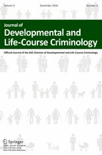
Journal of Developmental and Life-Course Criminology
Fostering Knowledge in the Evolution of Criminal BehaviorThe Journal of Developmental and Life-Course Criminology, published by Springer International Publishing AG, stands as a vital resource in the interdisciplinary fields of criminology, psychology, and social sciences. With an ISSN of 2199-4641 and an E-ISSN of 2199-465X, this journal provides a platform for high-quality research that examines the intricate relationships between developmental pathways and criminological outcomes. The journal has been recognized with impressive rankings, categorized as Q2 in Applied Psychology, Q1 in Law, and Q2 in Life-span and Life-course Studies for 2023, reflecting its significance in advancing knowledge within these domains. With Scopus rankings placing it within the top percentiles, it offers a unique Open Access option, making research widely accessible to scholars, practitioners, and students seeking insights into the lifecycle approach to crime and justice. Operating from Switzerland at Gewerbestrasse 11, Cham CH-6330, Switzerland, the journal aims to foster scholarly communication and meaningful discourse on pivotal issues pertaining to developmental criminology from 2015 through 2024 and beyond.
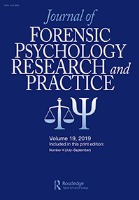
Journal of Forensic Psychology Research and Practice
Unlocking the Complexities of Forensic Psychology.Journal of Forensic Psychology Research and Practice is a distinguished publication within the fields of Applied Psychology and Pathology and Forensic Medicine, published by Routledge Journals, Taylor & Francis Ltd. With a commitment to advancing knowledge from 2017 to 2024, this journal aims to bridge theory and practice by showcasing empirical research, including case studies and innovative methodologies, that address the complexities of forensic psychology in contemporary settings. While it holds a respectable Q3 ranking in both Applied Psychology and Pathology and Forensic Medicine, making it a vital resource for scholars and practitioners alike, its insights contribute significantly to understanding the psychological aspects of criminal behavior and legal processes. Researchers, professionals, and students are encouraged to engage with its content to further their understanding and application of forensic psychology principles in real-world scenarios.
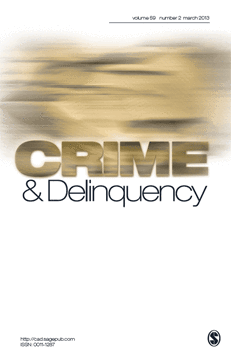
CRIME & DELINQUENCY
Exploring the complexities of criminal behavior.CRIME & DELINQUENCY, published by SAGE PUBLICATIONS INC, is a premier journal dedicated to advancing the study of criminology and criminal justice. With an esteemed ISSN of 0011-1287 and E-ISSN 1552-387X, this influential journal has been a vital resource since its inception in 1955, continuing to engage in rigorous research and discourse through to 2024. Recognized with a Q1 ranking in both Law and Pathology and Forensic Medicine, CRIME & DELINQUENCY boasts an impressive Scopus ranking, placing it in the top 8% of journals in Social Sciences - Law and the top 31% in Medicine - Pathology and Forensic Medicine. This journal serves as an essential forum for researchers, professionals, and students to explore pressing issues related to crime, delinquency, and their societal implications. Although not an open-access journal, it offers a valuable repository of insightful research and analysis that informs practices and policies within the field. To stay abreast of the latest findings and contribute to the ongoing discourse, CRIME & DELINQUENCY is a must-read for all committed to understanding and addressing criminal behavior in society.
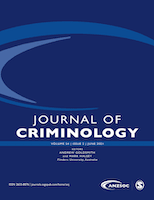
Journal of Criminology
Illuminating the intersection of law and social control.Journal of Criminology, published by SAGE Publications Ltd, serves as a leading platform for scholarly discourse in the field of criminology, exploring the complexities of crime, justice, and social control. With an ISSN of 2633-8076 and an E-ISSN of 2633-8084, this open-access journal has quickly established itself, achieving a prestigious Q1 ranking in Law as per the 2023 Category Quartiles. Spanning a converged timeframe from 2021 to 2024, the journal primarily focuses on promoting innovative research and critical analyses that inform policy and practice within the legal frameworks and criminological theories. Its impactful contributions are evidenced by its impressive Scopus Rank of #104 out of 1025 in Social Sciences Law, placing it at the 89th percentile among its peers. Positioned in the heart of London at 1 Olivers Yard, 55 City Road, London EC1Y 1SP, England, the Journal of Criminology is dedicated to advancing knowledge and understanding in a rapidly evolving discipline, making it an invaluable resource for researchers, professionals, and students alike.
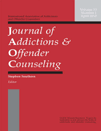
JOURNAL OF ADDICTIONS & OFFENDER COUNSELING
Exploring Interdisciplinary Solutions for Addictions and Offender CounselingJOURNAL OF ADDICTIONS & OFFENDER COUNSELING, published by Wiley, serves as a critical platform for interdisciplinary research at the intersection of psychology, law, and social issues related to addictions and criminal behavior. With a commitment to excellence since its inception in 1990, this journal boasts an impressive Scopus rank within the top quartiles of its fields—ranking Q2 in Law and Q3 in both Clinical and Social Psychology as of 2023. While currently not designated as an Open Access publication, it provides a wealth of peer-reviewed articles that promote the understanding and counseling of offenders, making it invaluable for researchers, practitioners, and students alike. The journal addresses critical contemporary issues, fostering discussions that influence policy and therapeutic practices, ensuring its vital role in advancing knowledge and effective interventions in addiction and offender counseling.

Journal of Criminological Research Policy and Practice
Empowering Change with Research-Driven SolutionsJournal of Criminological Research Policy and Practice is a pioneering platform dedicated to the exploration and dissemination of knowledge in the interdisciplinary field of criminology. Published by Emerald Group Publishing Ltd, this journal features high-quality research that addresses contemporary issues and innovative practices in areas such as law, public administration, and social psychology. With an ISSN of 2056-3841 and an E-ISSN of 2056-385X, the journal has garnered a notable presence in the academic community, showcasing a Q3 ranking in Law and Sociology & Political Science as of 2023. The journal provides valuable insights for researchers and practitioners alike, advancing the discourse on criminological policy and its implications for society. It serves as an essential resource for those invested in enhancing social justice, informing policy-making, and understanding the complexities of crime within a broader social context. Encompassing research from 2015 to the present and extending into 2024, the journal stands as a critical reference point for future studies and professional practice in criminology.

Annual Review of Criminology
Elevating Research Standards in Criminology.The Annual Review of Criminology is a premier academic journal dedicated to advancing the field of criminology through comprehensive reviews of the latest research and emerging trends. Published by Annual Reviews, this journal is highly regarded within the legal realm, boasting a prestigious Q1 ranking in the Law category and an impressive Scopus rank of #13 out of 1025, indicating its significant influence with a 98th percentile standing. The journal focuses on synthesizing key developments from various branches of criminology, making it an essential resource for researchers, professionals, and students alike. Although it does not offer open access, readers can engage with high-quality, peer-reviewed articles that not only address contemporary issues but also provide foundational knowledge for future inquiries. With volumes converging from 2018 to 2021 and 2023 to 2024, the Annual Review of Criminology underscores its commitment to scholarly excellence and the dissemination of critical insights in the evolving landscape of criminal justice.
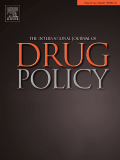
INTERNATIONAL JOURNAL OF DRUG POLICY
Shaping Evidence-Based Solutions for Drug ManagementInternational Journal of Drug Policy, published by Elsevier, stands as a crucial scholarly platform dedicated to advancing the field of drug policy research. With an impactful focus on health policy and medicine, this journal holds a prestigious Q1 ranking in both Health Policy and Medicine (miscellaneous) categories as of 2023, reflecting its high-quality contributions to the discourse surrounding drug use, regulation, and public health. Spanning publication from 1998 to 2024, the journal's rich archive of research serves as an essential resource for researchers, professionals, and students alike. While the journal is not open access, it provides invaluable insights and significant findings that drive policy-making decisions and foster evidence-based practices in drug management and health interventions. With a Scopus rank of #28 out of 310 in Health Policy and #55 out of 398 in Medicine (miscellaneous), the International Journal of Drug Policy is indispensable for those committed to exploring and understanding the complexities of drug-related issues on a global scale.